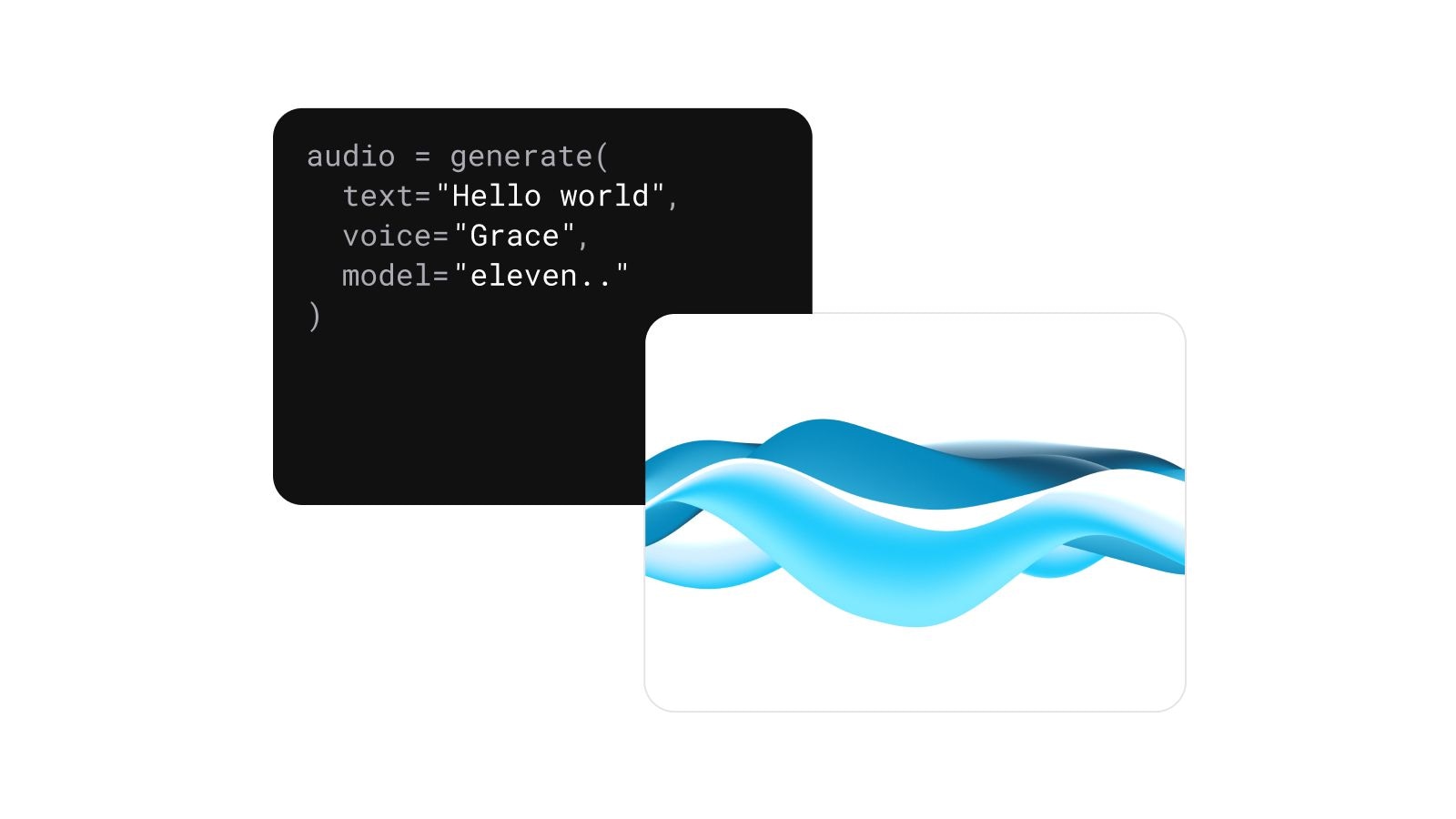
Easily integrate our low-latency Text to Speech API and bring crisp, high-quality voices to your applications with minimal coding effort
This article explores the 10 best TTS APIs, offering a comprehensive guide to how they work, their top features, potential pitfalls, and what each tool sounds like.

From natural-sounding speech synthesis to multilingual capabilities, these APIs redefine the way we interact with digital content.
Whether you're developing educational software, customer service bots, or innovative apps, this list provides valuable insights into selecting the right TTS API to meet your specific needs and take your projects to the next level.
| Tool Name | Key Features | Pros | Cons | Pricing Plans | Rating |
|---|---|---|---|---|---|
| ElevenLabs | Quality Speech, Voice Library, Voice Cloning | Human-sounding, voice cloning, audio quality | Limited speech nuances, complex for basics | Free - $330/mo, Enterprise: Contact | ⭐⭐⭐⭐⭐ |
| Amazon Polly | Natural Voices, Deep Learning, SSML Tags | Natural speech, language support, fast response | SSML knowledge needed, AWS dependent | Pay-As-You-Go, Free Tier available | ⭐⭐⭐⭐ |
| Descript | AI Realism, Podcast Production, Script Writing | Accurate transcription, editing tools, user-friendly | Transcription errors, desktop-only, language limit | Free - $24/mo, Enterprise: Custom | ⭐⭐⭐⭐ |
| Google Cloud | Custom Voice, Multilingual, Neural Network Tech | 220+ voices, 40+ languages, customizable | Technical skill needed, no voice downloads | Pay-as-you-go, Different tiers | ⭐⭐⭐ |
| IBM Watson | Custom Tools, Multilingual, Format Compatibility | Customer engagement, many languages, security | Word mispronunciation, API complexity | Free - Premium, Deploy Anywhere: Contact | ⭐⭐⭐ |
| Lovo | AI Voice Cloning, Multilingual, Music Integration | Simple interface, 500+ voices, cloning | Cloning limited to English, environment dependent | Free trial, $19 - $99/mo, Enterprise: Custom | ⭐⭐⭐ |
| Murf.ai | Natural Voices, Collaboration Tools, Multilingual | Quality voice, efficient, extensive language support | Limited customization, security concerns | Free - $75/user/month | ⭐⭐⭐⭐ |
| Play.ht | 800+ AI Voices, 140+ Languages, Custom Pronunciations | Natural AI voices, multilingual, range of voices | Limited non-English voices, free plan limits | Free - $79.20/month, Enterprise: Custom | ⭐⭐⭐ |
| Resemble AI | Voice Cloning, Speech to Speech, Editing | Efficient, customizable, user-friendly | Technical expertise required, limited languages | Basic: $0.006/sec, Pro: Contact | ⭐⭐ |


Easily integrate our low-latency Text to Speech API and bring crisp, high-quality voices to your applications with minimal coding effort
To use ElevenLabs' API, you first need to sign up for an API key on the website. Then, you can make a basic request by sending a POST request to their endpoint with your API key and the desired text. The API returns audio data in the form of an ArrayBuffer, which can be converted into an MP3 blob file for playback or saving.
Amazon Polly's API operations allow for synthesizing high-quality speech from plain text and Speech Synthesis Markup Language (SSML). It provides options for customizing and controlling speech output, supporting lexicons and SSML tags.
Amazon Polly can be used to add speech to applications with a global audience, like RSS feeds, websites, or videos.
Descript's API enables audio generation and editing, with a focus on Overdub, a feature that generates audio using selected voice IDs. Users can create audio tasks and fetch results quickly. The API also supports editing, allowing the transfer of audio or video to Descript via Import URLs.
Export features include various file formats, Descript link sharing, and cloud export for publishing. It ensures metadata consistency for projects edited in Descript and returned to partners. For security and efficiency, the API uses personal tokens and imposes rate limits like 500 overdubs per minute.
Note that only Descript Enterprise customers can use the Overdub API.
Descript
The Google Cloud Text-to-Speech API leverages advanced neural networks to convert text into human-like speech. This capability is particularly advantageous for creating interactive voice response systems and enhancing user experiences.
It offers customizable options like pitch, speaking rate, and volume gain, and integrates seamlessly with other Google Cloud services, such as Dialogflow and Translations API.
Google Cloud
IBM Watson's text to speech service supports a synchronous HTTP REST interface and a WebSocket interface for speech synthesis, accepting both plain text and SSML input.
SSML is an XML-based markup language for text annotation in speech-synthesis applications. The service also features customization options for sounds-like or phonetic translations, and a Tune by Example feature for defining custom prompts and speaker models.
IBM Watson
Lovo's APIs convert written text into realistic speech. The process involves analyzing linguistic patterns to produce natural-sounding voices. Users simply type in the text and generate the audio, facilitated by the sophisticated technology behind Lovo.
Microsoft Azure's Text to Speech API, part of its Cognitive Services, is designed to convert text into synthesized speech. It converts text into synthesized speech using a REST API and supports neural text to speech voices.
The API utilizes endpoints like tts.speech.microsoft.com for listing voices and cognitiveservices/v1 for converting text to speech. It also uses POST requests with SSML or plain text, and successful responses return an audio file in the requested format.
Microsoft Azure’s API requires authorization headers (Ocp-Apim-Subscription-Key or Authorization: Bearer) for access, with tokens valid for 10 minutes.
J.K. Rowling, Harry Potter and the Philosopher's Stone, Fragment 2
The Murf.ai text-to-speech API converts written text into spoken words using digital signal processing algorithms. This integration is simple and secure, fitting seamlessly into existing technology stacks.
Key functionalities include real-time text-to-speech conversion, a wide variety of voices, support for multiple languages and dialects, and the ability to output in various audio formats like MP3, FLAC, and WAV.
The API allows access to AI Voices from various providers including PlayHT, Google, Amazon, IBM, and Microsoft through a single interface. This unified approach saves time and simplifies maintenance since you only need one integration.
PlayHT's Turbo voice models can generate speech in less than 300ms, and the API automatically updates to include all improvements made by the TTS providers, ensuring access to the latest voices.
Users can access a growing library of 829 high-quality voices in different languages and can manipulate voice tones, including volume, rate, and pitch, for unique voice effects.
The API also supports text and Speech Synthesis Markup Language (SSML), allowing for advanced pronunciation instructions and other effects.
PlayHT TTS1
Resemble.AI’s API enables the rapid creation and integration of custom AI voices using modern tools. It allows for fetching existing content, creating new clips, and building voices on-the-fly.
This functionality is vital for producing content in sync with low latency, making it ideal for real-time applications.
Developers can use the API to programmatically control voices, either through the API itself or within the Unity engine. This flexibility is particularly beneficial for creating unique character voices in video games and other interactive media.
The API offers a one-click upload functionality, allowing users to clone speech from any given audio. This feature is useful for those who have existing audio from voice talents and wish to bring these voices onto the Resemble AI platform.
However, it's important to note that valid consent from the voice talent must be provided for the audio files uploaded.
ResembleAI
Text to Speech (TTS) technology converts written text into spoken words, using artificial intelligence and natural language processing. It enables applications to read out text, enhancing user engagement and accessibility. Try Eleven v3, our most expressive text-to-speech model yet.
This technology has evolved significantly, offering more natural and human-like voices. Understanding its underlying mechanisms, such as speech synthesis and voice modulation, is key for developers looking to integrate TTS in their applications.
Integrating TTS APIs into applications offers numerous benefits. It improves accessibility for users with visual impairments or reading difficulties, expands reach to non-readers, and enhances multitasking capabilities.
TTS also supports diverse language needs, making content universally accessible. By providing auditory content, TTS APIs facilitate better user engagement and can significantly enhance the user experience in various applications, including e-learning, navigation, and customer service.
Pricing models for TTS APIs vary widely. Some offer free tiers with basic features, ideal for small-scale projects or experimentation.
Subscription-based models, on the other hand, typically provide more advanced features and higher usage limits, catering to larger businesses.
Pay-as-you-go options allow for flexibility and are cost-effective for fluctuating usage. When selecting a TTS API, consider factors like the scale of your project, required features, and budget constraints to choose the most suitable pricing model.
Text to Speech (TTS) APIs convert written text into spoken words, leveraging artificial intelligence to produce natural-sounding speech.
These tools are vital for enhancing accessibility, supporting multilingual communication, and improving user engagement across various applications.
TTS APIs are especially beneficial for those with visual impairments or reading difficulties. When selecting a TTS API, consider the quality of speech synthesis, language and customization options, integration ease, pricing models, and security measures.
These factors ensure the API meets specific project needs while providing a seamless and inclusive user experience.

Easily integrate our low-latency Text to Speech API and bring crisp, high-quality voices to your applications with minimal coding effort
ElevenLabs stands at the forefront of AI voice generation technology. We offer a selection of 120 unique voices in 29 languages.
What’s more, our tool's intuitive interface lets you fine-tune your audio, whether you're producing an audiobook or adding flair to video game narration. Trusted by digital creators worldwide, Eleven Labs sets the standard for lifelike, versatile, and secure AI-generated speech.

Easily integrate our low-latency Text to Speech API and bring crisp, high-quality voices to your applications with minimal coding effort

Scaling incredible experiences for millions of users in Hindi and English

AI-generated videos created with avatars & dubbed voice have grown 7x
Powered by ElevenLabs Conversational AI